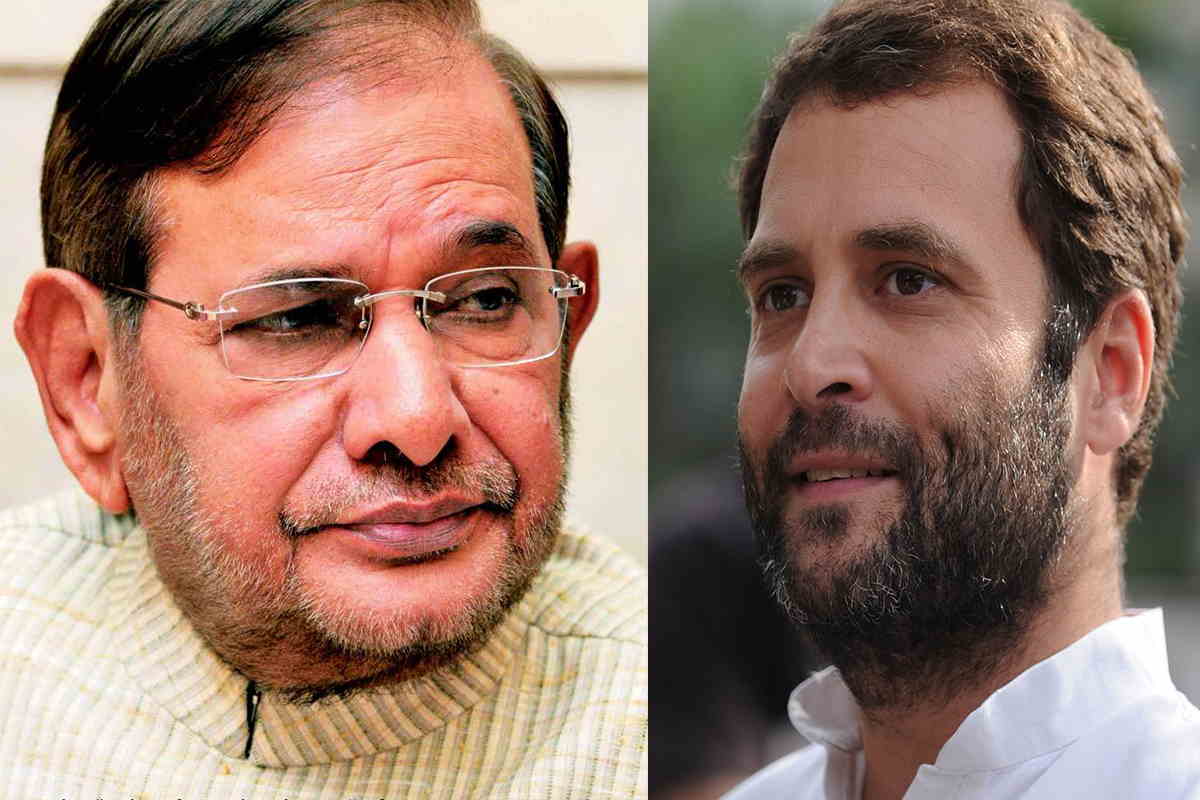[vc_row][vc_column][vc_column_text]Opposition leaders at the ‘Sajha Virasat Bachao’ (Save Composite Heritage) meet of Opposition parties, called by JD(U) leader and Rajya Sabha MP Sharad Yadav, slammed Prime Minister Narendra Modi and his government for poor governance and trying to impose RSS ideology on the country.
Top leaders of the Congress, the Left, Samajwadi Party, BSP, TMC and other parties opposed to the BJP were invited to the meet seen as Yadav’s show of strength against the JD(U) chief and Bihar Chief Minister Nitish Kumar, with whom he fell out over Kumar’s decision to rejoin hands with the BJP. Former prime minister Manmohan Singh, CPM general secretary Sitaram Yechury and CPI MP D Raja were among those in attendance.
Speaking at the conclave, Congress vice president Rahul Gandhi attacked the BJP Government at the Centre and the RSS, saying Prime Minister Modi party’s ideological parent RSS follows “a divisive agenda.”
He claimed the government has not been able to keep its promises and said the public wants to see a ‘sach Bharat’. “Modi-ji says he wants to create a Swachch Bharat but we want Sach Bharat. Wherever he goes he lies,” Gandhi alleged.
He also attacked the government’s flagship ‘Make in India’ programme claiming that it has failed. “Modi Ji gave ‘Make In India’ but most things are ‘Made In China’. Truth is that Modi Ji’s ‘Make In India’ has failed,” Gandhi said.
Attacking the RSS, he alleged the saffron arm of the BJP wants to divide India on caste lines and accused the Modi Government of imposing RSS ideology in every institution of the country. “There are two ways of looking at the country – some say that this is their country, while others say they belong to the country. And this is the difference between us and the RSS. RSS says this country is ours, you are not from this land. In Gujarat, Dalits were assaulted and told they are not from this country,” Gandhi said.
He claimed that the RSS is attempting to change the constitution. “In the constitution it was written ‘one man, one vote’. Whatever the constitution guarantees, RSS seeks to destroy it. They want to change the constitution,” he said.
“RSS knows that their views are not going to win elections, so they have embedded their people in every institution… Till the time RSS hasn’t ruled India, they haven’t saluted the flag,” he added.
Gandhi also attacked the central government over the recent farmer deaths. “Jaitley says in the Lok Sabha that waiving farm loans is not this government’s policy. No matter how many farmers die, they don’t care,” he said.
BJP did not keep promise of bringing back black money or offering jobs to youth. They are helping corporates, but not farmers, he said.
Mentioning the recent Gorakhpur tragedy where more than 70 children succumbed to encephalitis at Baba Raghav Das Medical College hospital, Rahul said the incident highlights the poor healthcare policies of the Modi government.
The event was seen as Yadav’s show of strength and a message to Bihar Chief Minister Nitish Kumar. Earlier, Yadav said Ghulam Nabi Azad and Ahmed Patel, besides former PM Singh and Gandhi from the Congress, Yechury of the CPI(M), Akhilesh Yadav, Ram Gopal Yadav and Naresh Aggarwal of the SP, Manoj Jha of the RJD, Farooq Abdullah of the National Congress and former Jharkhand chief minister Babu Lal Marandi had confirmed their participation.
Yadav had termed Nitish Kumar’s joining hands with the BJP to form government as betrayal of the people’s mandate and also claimed that the original party is with him. Yadav had also undertaken a three-day tour of Bihar with an aim to hold direct dialogue with the people. In the recently held Rajya Sabha elections in Gujarat, a party MLA had voted against BJP. The MLA was said to be close to Yadav.
Bihar chief minister and JD(U) president Nitish Kumar removed Sharad Yadav as party leader in Rajya Sabha and 21 JD(U) leaders close to him from their party posts.
With Yadav making it clear that he is charting a different path, JD(U) leaders maintained restraint in using harsh words against him but expressed their displeasure particularly over his company with Lalu Prasad’s RJD. They had also advised Yadav against holding the conclave and said he should attend the JD(U)’s national executive meeting in Patna on August 19.
JD(U) leader KC Tyagi suggested that the veteran socialist will cross the red line of the party’s discipline if he takes part in the RJD’s August 27 rally in Patna as he called the Prasad-led party “corrupt” and “evil forces”.[/vc_column_text][/vc_column][/vc_row]


 India News10 hours ago
India News10 hours ago
 India News11 hours ago
India News11 hours ago
 LATEST SPORTS NEWS10 hours ago
LATEST SPORTS NEWS10 hours ago
 India News10 hours ago
India News10 hours ago
 Latest world news4 hours ago
Latest world news4 hours ago
 India News2 hours ago
India News2 hours ago












